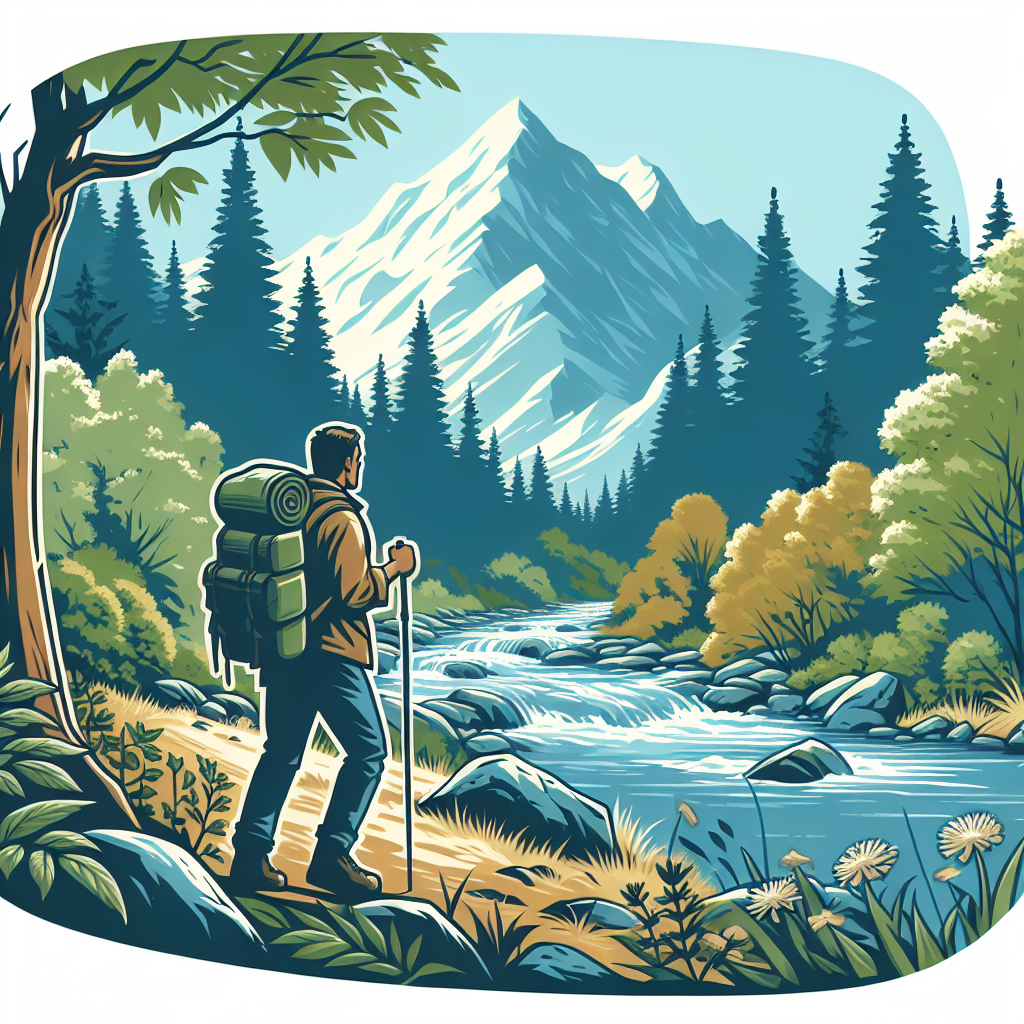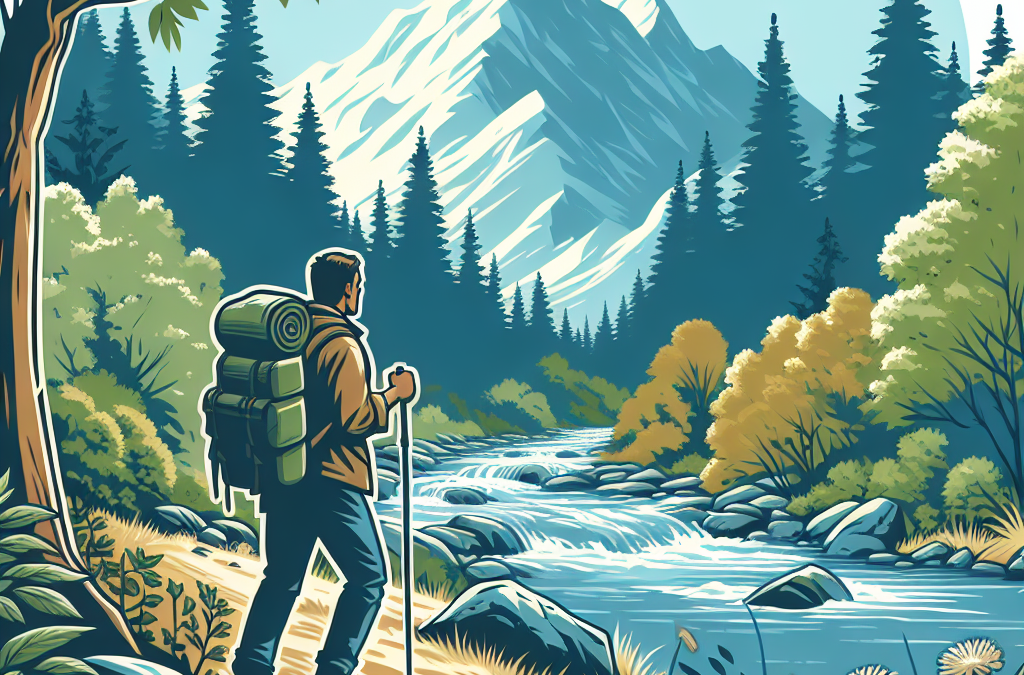Setting off on a journey into nature doesn’t need to put a dent in your wallet. “Budget Hiking: Enjoying The Trails Without Breaking The Bank” shows you how to truly experience the serene beauty of hiking while also providing valuable advice on how to keep costs in check. This piece is perfect for those wanting to explore the unknown territories on a shoestring budget. It’s all about encouraging the wanderer in you to hit the trails without the financial worries!
Understanding the Basics of Budget Hiking
Budget hiking is all about exploring the forests, ascending peaks, and basking in the serenity of nature, without having to burn a hole in your pocket. Sounds exciting, right? Let’s break down this concept further so you can enjoy all the fabulous trails without emptying your bank account.
Understanding the Concept of Hiking
Hiking is a form of walking, taken in the natural environments like mountains, forests, and trails. It is an activity where you challenge yourself mentally and physically, connect with nature, and explore the unexplored.
Benefits of Budget Hiking
Budget hiking opens the doors to an array of possibilities. It allows you to immerse in the environment, challenge your limits, experience tranquility, and reap health benefits without straining your finances. Hiking combines physical activity with mindfulness, helping to reduce stress and anxiety, while promoting cardiovascular fitness.
Why Choose Budget Hiking Over Other Options
Budget hiking trumps other options for a plethora of reasons. It’s a cost-effective way to explore and adventure. You’re not only saving money, but you’re also expanding your horizons and cultivating self-reliance skills that will last a lifetime.
Planning a Budget Hike
Planning is critical in budget hiking. With a meticulous plan, you can enjoy a great hiking experience without unnecessary expenses.
The Importance of Pre-Hike Planning
Assess and plan your budget sensibly, taking into account all things – gear, meals, transportation, and accommodation. Pre-hike planning ensures you are well-prepared, equipped, and with minimized stress levels.
Choosing the Right Trail
Choosing the right trail is essential to align with your physical ability, landscape preference, and budget. Trails that are closer to home or have free entrance can help save money.
Seasonal Considerations
A crucial part of your planning process is the season. Off-peak hiking, when the trails are less crowded, may help you to save on accommodation and entrance fees. Weather conditions are also a consideration in planning for necessary clothing and gear.

Utilizing Free and Low-cost Resources
Taking advantage of free and low-cost resources can save you a substantial amount of money as you plan your hike.
Identifying Free Hiking Trails
Many trails don’t require entry fees. Use criteria to search for such trails in your area and you’ll discover a whole new world of cost-free adventure.
Utilizing Online Resources and Hiking Apps
There are plenty of online resources and hiking apps that offer free trail maps, hiking tips, weather updates, and community support. Utilize these online platforms to plan your hike effectively.
Clubs and Organizations Offering Budget Hiking Opportunities
Many organizations and clubs offer discounted or free hiking trips. Joining these groups can save you money and also provides an excellent opportunity to meet like-minded hikers.
Budgeting for Gear and Clothing
Investing in quality gear and clothing is important for your safety and comfort on the trails.
Understanding the Importance of Proper Hiking Gear
Having the proper hiking gear is critical for your safety and the ultimate hiking experience. It improves your comfort and protection from harsh weather conditions.
Investing Wisely in Essential Gear
Invest wisely in essential gear such as shoes, backpacks, and weather-appropriate clothing. Prioritize on high-quality products that guarantee durability and functionality, even if it means spending a bit more at the time of purchase.
Finding Value in Second-hand Gear
There’s a lot of value to be found in pre-owned gear. You can find gently used high-quality hiking gear at significantly lower prices.

Cost-Efficient Nutrition and Hydration
Planning nutritious meals and hydration is important for completing your hike successfully, and it doesn’t have to be expensive.
Financially Sensible Meal Planning
Planning meals is a great way to save money. Opt for ingredients that are cheap, lightweight, and easy to cook.
Economical Hydration Solutions
Drinking plenty of water is crucial to stay hydrated. A reusable water bottle or a hydration bladder is a cost-efficient solution that is eco-friendly too.
Savings on Snacks and Supplements
Buying snacks and supplements in bulk can save money. Opt for nutritious snacks like nuts, seeds, dried fruit, and energy bars.
Affordable Transportation Options
Careful selection of transportation options can result in considerable savings.
Carpooling and Public Transport Options
Carpooling with fellow hikers or using public transport can significantly cut down your travel costs. It also allows you to share the excitement of your hike with others.
Choosing Nearby Trails to Save on Fuel
Choosing trails close to home helps to save on fuel costs. It also allows you more time to hike by reducing travel time.
Making Use of Cycling or Walking
If your hiking trail is nearby, consider cycling or walking there. Not only will you save money, but you’ll also enjoy extra exercise and warm up on the way.
Budget-Minded Accommodation Options
The right choice of accommodation can significantly reduce your hiking costs.
Camping Over Hotels
Camping is a cost-efficient alternative to hotels. Not only is it cheaper, but it also lets you experience the serenity of nature at close quarters.
Utilizing Hostels and Budget Lodging
Hostels and budget lodges are great alternatives if camping isn’t your thing. They often have the necessary facilities and allow you to meet other adventurers.
Considerations for Backcountry Camping
Backcountry camping can provide a budget-friendly and fabulous experience. You need to plan carefully for this, ensuring you have the required permissions and necessary camping equipment.
Safety Considerations on a Budget
Never compromise on safety, even when hiking on a budget.
Must-Have, Low-Cost Safety Gear
Ensure you have essential safety gear such as a compass, map, headlamp, first-aid kit, and multi-tool. Many of these items are relatively low-cost but can prove invaluable.
Utilizing Free Safety and Hiking Training Resources
There are many free resources available that provide safety guidelines, first aid procedures, and hiking tips. Make full use of these to ensure your hike goes smoothly.
Understanding the Consequences of Skimping on Safety
Skipping on safety to save a few bucks can lead to dire consequences. Never compromise on safety; it’s always better to be safe than sorry.
Long-Term Savings Strategies for Hikers
Investing in long-term savings strategies can help spread out the costs of hiking over time.
Gear Maintenance for Longevity
proper maintenance can increase the lifespan of your gear. Taking care of your gear can keep it in prime condition, reducing the necessity for frequent replacements.
Investing in Quality, Multi-Functional Gear
It’s worth investing in quality gear that can serve multiple purposes. For instance, a good-quality water-resistant jacket can work as wind protection, rain cover, and an extra layer for warmth.
Signing up for Retailer Reward Programs
Many outdoor retailers offer reward programs that include discounts on future purchases. Sign up for these rewards programs and save money in the long run.
Money-Saving Hiking Habits
Adopting a few money-saving habits can add up to substantial savings over time.
Hiking in Groups for Savings
hiking in a group can help you save money on costs such as transportation, guide fees, or shared equipment. Plus, hiking in a group can be a fun and sociable experience.
Joining Hiking Clubs for Discounts
Join hiking clubs to avail of discounts on gear, trips, and courses. Additionally, members often share helpful tips and advice.
Off-peak Hiking to Avoid Entrance Fees
Choose to hike off-peak, when trails are less crowded and entrance fees may be reduced or waived. However, be sure to check seasonal weather conditions before planning.
Budget hiking is all about smart planning and making wise decisions. With careful strategy and resourcefulness, it’s entirely feasible to enjoy fantastic hiking experiences while staying within your budget. Start planning your budget hiking adventure and enjoy the trails without breaking the bank. Happy hiking!

